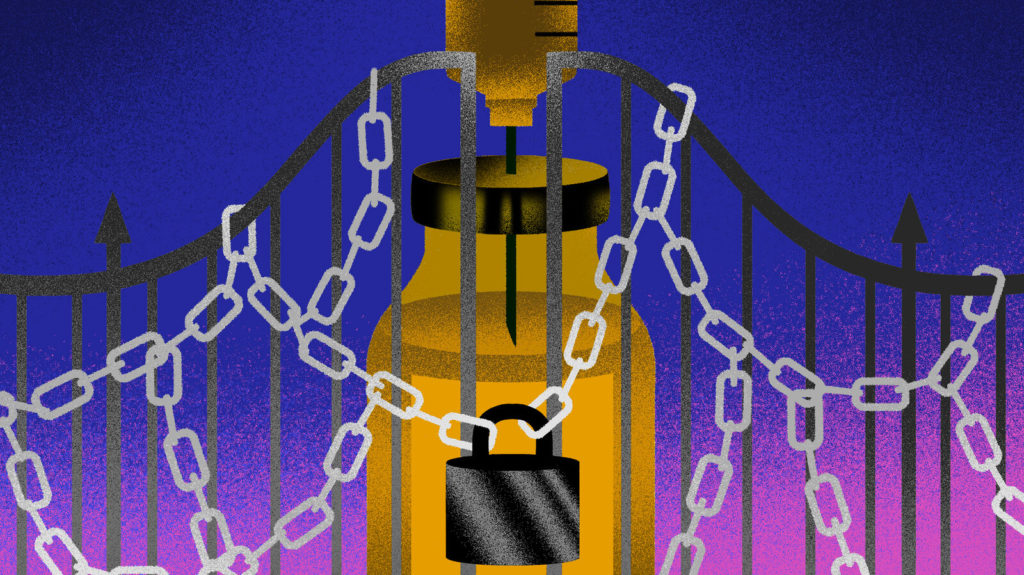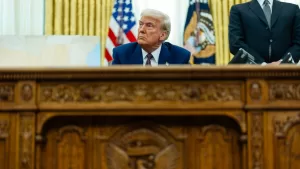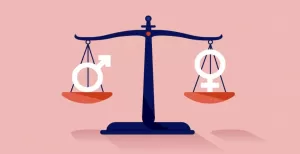Dean Baker, Achal Prabhala and Arjun Jayadev
As some reports would have it, this is the beginning of the end. Three coronavirus vaccines have posted excellent results, with more expected to come.
But this is not the beginning of the end; it is only the beginning of an endless wait: There aren’t enough vaccines to go around in the richest countries on earth, let alone the poorest ones.
That’s why it makes little sense that the United States, Britain and the European Union, among others, are blocking a proposal at the World Trade Organization that would allow them, and the rest of the world, to get more of the vaccines and treatments we all need.
The proposal, put forward by India and South Africa in October, calls on the WTO to exempt member countries from enforcing some patents, trade secrets or pharmaceutical monopolies under the organization’s agreement on trade-related intellectual property rights, known as TRIPs.
It cites the “exceptional circumstances” created by the pandemic and argues that intellectual property protections are currently “hindering or potentially hindering timely provisioning of affordable medical products”; the waiver would allow WTO member countries to change their laws so that companies there could produce generic versions of any coronavirus vaccines and Covid-19 treatments.
The idea was immediately opposed by the United States, the European Union, Britain, Norway, Switzerland, Japan, Canada, Australia and Brazil. It was opposed again at another meeting in November, and again last week.
By our count, nearly 100 countries favor the proposal, and yet because almost all decisions at the WTO are made by consensus, a small number of countries can thwart the will of the majority, even a super majority. (The organization has 164 members.)
The U.S. trade representative is reported to have said that protecting intellectual property rights and otherwise “facilitating incentives for innovation and competition” was the best way to ensure the “swift delivery” of any vaccines and treatments. The European Union has argued that there was “no indication that intellectual property rights issues have been a genuine barrier in relation to Covid-19-related medicines and technologies.” The British mission to the WTO agrees, characterizing the waiver proposal as “an extreme measure to address an unproven problem.”
In fact, the novel technology at the heart of the Moderna vaccine, for example, was developed partly by the National Institutes of Health using U.S. federal funds. Moderna then received a total of some $2.5 billion in taxpayer money for research support and as preorders for vaccines; by the company’s own admission, the $1 billion contribution it received for research covered 100 percent of those costs.
Moderna has pledged not to enforce its “Covid-19 related patents against those making vaccines intended to combat the pandemic.” But as Doctors Without Borders has pointed out, that offer is less generous than it seems since other types of intellectual property, such as know-how or trade secrets, typically are needed to develop and produce vaccines.
Pfizer, for its part, received a $455 million grant from the German government to develop its vaccine, and then, by our count, nearly $6 billion in purchase commitments from the United States and the European Union.
AstraZeneca benefited from some public funding while it was developing its vaccine, and received a total of more than $2 billion from the United States and the European Union for both research and in purchase commitments. It also signed a deal worth $750 million to supply the Coalition for Epidemic Preparedness Innovations and Gavi, the Vaccine Alliance with a total of 300 million doses.
In other words, the vaccines developed by these companies were developed thanks wholly or partly to taxpayer money. Those vaccines essentially belong to the people — and yet the people are about to pay for them again, and with little prospect of getting as many as they need fast enough.
We calculate, based on Pfizer’s and Moderna’s stated vaccine-production capacity and their supply deals with the United States and the European Union, as well as Japan and Canada, that these countries can expect, at best, to have about 50 percent of their populations covered by the end of 2021. Considering that 82 percent of the vaccines Pfizer says it can produce through next year and 78 percent of Moderna’s have already been sold to rich countries, according to the advocacy group Global Justice Now, imagine the likely shortages and delays for the rest of the world. (Canada is said to have placed so many preorders that it could end up with 10 doses per capita.)
AstraZeneca, to its credit, has struck deals with manufacturers in India and Latin America, as well as with Gavi, to help poor countries get access to its vaccine. (It has also committed not to make a profit from its vaccine during the pandemic—though, according to a Financial Times report based on company documents, AstraZeneca has retained the right to declare the end of the pandemic as early as July 2021.) That said, the company estimates that it will be able to make three billion doses by the end of 2021; that’s enough for only 20 percent of the world’s population.
Poor countries have faced such problems before. The WTO’s creation in 1995 coincided with a surge of HIV/AIDS in sub-Saharan Africa. By 1996, new treatments were developed that made AIDS a mostly manageable condition—though only for people who could afford them. Nongeneric drugs cost about $10,000 a year at the turn of the century, and were well out of the reach of many people in, say, South Africa. It took the South African government almost a decade to break the monopolies held by foreign drug companies that kept the country hostage, and kept people there dying.
In Brazil, Gilead Sciences, the monopoly owner of sofosbuvir, a breakthrough treatment for hepatitis C, has been in a deadlock with the government over expanding and cheapening access to the drug for Brazilians. By several accounts, when Gilead Sciences obtained patents for sofosbuvir in early 2019, it hiked the price for Brazilian public agencies from $16 to $240 a capsule. Yet that would drop to about $8 if the drug were produced locally under a compulsory licensing scheme that the TRIPs agreement already allows in some circumstances.
Countries in which drugs are relatively cheap, such as India, face another kind of challenge: attempts to overturn the laws that make those drugs accessible there. Novartis, the Swiss pharmaceutical giant, fought a decade-long battle to secure monopoly control in India over its treatment for leukemia, and in the process tried to have a key provision of Indian patent law struck down as unconstitutional. (It failed on both fronts.)
What’s more, the crisis of access to affordable medicines also affects countries whose governments defend extensive intellectual property protections for companies: insulin, for example, can be punishingly expensive in the United States.
Remdesivir, a drug used to treat Covid-19 (with mixed results), is now in short supply in the United States and Europe. Gilead Sciences, remdesivir’s manufacturer, has retained its monopoly over the drug in rich countries, but in May it signed licensing agreements with companies in 127 countries so that they could produce generic versions for sale there. The result? While there have been shortages of the drug in the West, it has been available in increasingly stable supplies in several poor countries, sometimes at one-tenth of the price.
But the governments of rich countries can push back against Big Pharma, too, and sometimes have done so—despite the pharmaceutical industry’s sometimes colossal financial clout. (Campaign and lobbying contributions from drug makers to the U.S. federal government totaled some $4.7 billion between 1999 and 2018, according to one recent study.) In the aftermath of 9/11, the United States feared an anthrax attack and needed unusually large supplies of ciprofloxacin from Bayer; when the government threatened to bypass the company’s patent and buy generic alternatives, the company lowered the price of the antibiotic and increased supplies.
In Britain last year, families of children with cystic fibrosis petitioned the government to suspend a company’s monopoly over Orkambi, the first significant treatment for the disease. After political parties threw their weight behind the petition, Vertex, the maker of Orkambi, agreed to sell the drug at a much lower price than it had been holding out for.
As for coronavirus vaccines and Covid-19 treatments, another meeting of the TRIPs Council is scheduled for Dec. 10; on Dec. 16 and 17 the WTO’s general council, one of the organization’s highest decision-making bodies, will meet. The United States, the European Union and Britain are expected to dig their heels in.
Yet mounting pressure from poor countries at the WTO should give the governments of rich countries leverage to negotiate with their pharmaceutical companies for cheaper drugs and vaccines worldwide. Leaning on those companies is the right thing to do in the face of a global pandemic; it is also the best way for the governments of rich countries to take care of their own populations, which in some cases experience more severe drug shortages than do people in far less affluent places.
Last month, the editorial board of The Wall Street Journal denounced the TRIPs waiver proposal put forward by India and South Africa as a “patent heist,” adding that “their effort would harm everyone, including the poor.” In fact, the effort would help everyone, including the rich — if only the rich could see that.
(Dean Baker is the senior economist at the Center for Economic and Policy Research in Washington, DC. Achal Prabhala is a fellow of the Shuttleworth Foundation in Bangalore. Arjun Jayadev is a professor of economics at Azim Premji University in Bangalore. Article courtesy: New York Times.)
❈ ❈ ❈
Editorial addition: Jayati Ghosh, in an article “Vaccine Apartheid”, adds:
The COVID-19 Vaccine Global Access Facility (COVAX)–led by the World Health Organization, the Coalition for Epidemic Preparedness Innovations, and Gavi, the Vaccine Alliance–was established precisely to prevent hoarding by rich-country governments, secure doses for all countries, and distribute those doses fairly, beginning with the highest-risk groups. So far, more than 180 countries, representing nearly two-thirds of the world’s population, have joined. This includes 94 higher-income countries, all of which have made legally binding commitments. All will have access to the vaccines in the COVAX list, and pay for their doses individually. The 92 lower-income countries that are parties to the facility will receive their doses free of charge.
But there is another problem: COVAX participants are still competing to secure bilateral deals with pharmaceutical companies, as there is no rule against it. The United Kingdom, for example, has reserved 40 million doses of the BioNTech-Pfizer vaccine. The European Union has finalized a deal for up to 300 million doses. The U.S., with its population of 328 million, has ordered 100 million doses, with the rights to acquire 500 million more–a target so high that it smacks of an attempt to corner the market.
Within days of its announcement, Pfizer had sold more than 80% of the vaccine doses it will be able to produce by the end of next year to governments representing only 14% of the global population. In other words, if this is the first safe and effective vaccine to get to market, the vast majority of the world’s population will have almost no access to it.
Many other vaccine candidates – there are currently over 200, around 50 of which are in the clinical-trial phase – are also spoken for. Rich-country governments have already cut deals for privileged access to vaccines being developed by Moderna (which has also reported promising results from clinical trials), Johnson & Johnson, and AstraZeneca, among others, should these candidates make it through the approval process. Obviously, low-income countries do not have this option.
Because a pandemic can be overcome only when it is overcome everywhere, embracing an every-country-for-itself approach would seem irrational. And yet, as the unseemly competition for vaccine doses indicates, that is exactly what many countries have done. Unless we change course, global health apartheid will become increasingly entrenched and drive inequality to new heights. And the pandemic will still be with us. We will have merely added new problems to the one we didn’t solve.




